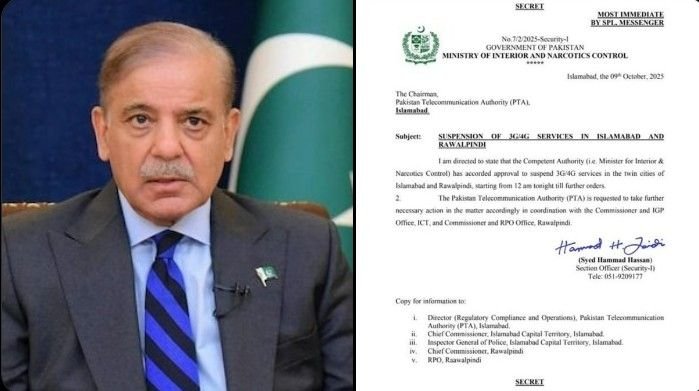In a sweeping security operation ahead of the Tehreek-e-Labbaik Pakistan (TLP) mass protest, Pakistani authorities have suspended mobile internet services in the capital Islamabad and neighbouring Rawalpindi, imposed Section 144 across Punjab, and sealed key routes leading into and out of the cities. The extraordinary measures are being justified by the government as necessary to maintain law and order amidst fears of unrest and violence.
The directive to halt 3G and 4G mobile services in the twin cities was issued late on October 9 by the Ministry of Interior and Narcotics Control, and communicated to the Pakistan Telecommunication Authority (PTA), with implementation beginning at midnight. The order warns that the blackout will remain in force “until further orders.”
Officials say the decision follows a prior outbreak of violence in Lahore, where law enforcement clashed with TLP supporters during raids on the party’s headquarters in a bid to arrest its leadership. Those confrontations left dozens injured, stoking fears that similar confrontations might erupt in Islamabad.
Simultaneously, Section 144 of the Criminal Procedure Code — which bans public assemblies, rallies, demonstrations, and the display of weapons — has been declared across Punjab province, including in Rawalpindi, for at least 10 days.
In Rawalpindi, authorities announced that Section 144 will remain active until October 11. In Islamabad, large portions of the city’s Red Zone — which houses diplomatic missions, government offices, and sensitive infrastructure — have been barricaded and sealed off. Only authorized personnel are being allowed entry, primarily via Margalla Road.
To enforce these restrictions, authorities have deployed shipping containers, trailers, and police roadblocks at major junctions including Faizabad, Zero Point, Serena Chowk, Nadra Chowk, and along express routes linking the cities. Roughly 7,000 security personnel — comprising policemen, Frontier Constabulary, and Rangers — are said to have been mobilised to guard key access points and respond to any outbreak of civil disorder. The TLP has planned the “Labbaik Ya Aqsa Million March” for October 10, aiming to march from Faizabad to the U.S. Embassy in Islamabad to express solidarity with Palestinians amid ongoing tensions in Gaza. In its official appeal to the deputy commissioner of Islamabad, the TLP requested security guarantees for a “peaceful rally” and emphasized that its workers and sympathisers would participate from across Pakistan.
Critics argue the blackout and restrictions represent heavy-handed, preemptive control measures that may curtail citizens’ rights to communicate and assemble. Lawyers in Islamabad, in particular, have protested the sealing of access points, saying they impede the ability of legal professionals to reach courts and attend hearings — and requested the judiciary to take cognisance of their constrained access.
This is not the first time Pakistan has resorted to communications blackouts during political or religious unrest. In recent years, the state has intermittently blocked mobile data, social media platforms, or entire internet access citing national security and public order, particularly during elections, protests, or riots.
As the capital braces for Friday’s protest, many fear tensions could flare if demonstrators attempt to breach the tightly secured Red Zone. Law enforcement agencies remain on high alert, and the country awaits whether the TLP’s show of force will escalate into a standoff or be contained under the heavy security clampdown.








